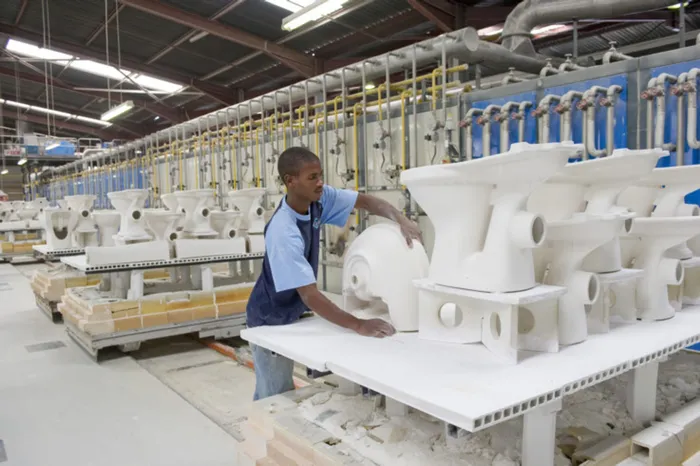Tile maker pauses R500m factory

Mr Mcebo Masuku, Betta Sanitaryware, Ceramic Industries. Mr Mcebo Masuku, Betta Sanitaryware, Ceramic Industries. Mr Mcebo Masuku, Betta Sanitaryware, Ceramic Industries. Mr Mcebo Masuku, Betta Sanitaryware, Ceramic Industries.
Roy Cokayne
Ceramic Industries has put a project to build a R500 million large-format tile factory on hold because of difficulties obtaining prospecting and mining licences from the Department of Mineral Resources (DMR).
Nick Booth, the chief executive at Ceramic Industries, said yesterday that the proposed new factory would be located in Vereeniging and was expected to create about 120 direct jobs.
The project was frozen due to “DMR constraints in its ability to make things happen”.
The prospecting and mining licences would allow the listed tile and sanitaryware manufacturer to secure new clay deposits to support its investment. The company had been trying to get the project off the ground for the past year and it was now on hold for a further year.
This meant Ceramic Industries’ board would not give permission to any capital expenditure on the project until the supply of raw materials was guaranteed.
Most of the work for the feasibility study had been done, the group knew where the raw materials were located and now it needed to do the prospecting to prove this, he said.
The project was close to finalisation and the board would approve the project if Booth could prove the company had got the raw material supplies, which was dependent on the DMR issuing the prospecting and mining licences.
Booth said the Department of Trade and Industry had approved the tax incentives for the project, which apart from the prospecting and mining permits was the other key factor determining the decision to proceed with the project.
“We understand the need for the plant, the market, the challenges of marketing the product, we have the skills base, we have the land and the commitment from both Sasol and Eskom for energy supplies but can’t move without the raw material supplies,” he said.
Explaining the need for the new plant, Booth said that it could not manufacture porcelain tiles in any of its existing factories and no porcelain tiles were made locally.
Booth said Ceramic Industries was losing market share to large-format porcelain floor tiles imported from China.
The planned plant would have the capacity to manufacture about 30 000m2 of large format porcelain tiles a day, which equated to almost 10 million square metres a year.
Ceramic Industries’ financial performance in the year to July was knocked by weak demand, which was exacerbated by the influx of cheap imported product.
Booth said the importation of cheap product was made possible by the strong rand and led to an underutilisation of the group’s factories and put pressure on unit costs.
Headline earnings a share shed almost 31 percent to R7.85. Revenue dropped 3 percent to R1.55 billion. Operating profit fell 23 percent to R192 million.
The group declared a special dividend of R15 a share in May, which it said shareholders should treat as a payment out of profit and to return surplus cash to shareholders.
A final dividend of R1.60 was declared, which boosted the year’s total dividend to R3 and matched the ordinary dividend declared in the previous year.
Booth said that management’s focus would remain on leveraging efficiencies in an environment of reduced demand and retaining and growing market share. It would do this by ensuring the group’s product range continued to compete successfully against imported products.
There were no indications the economy in general or the building and construction industry in particular would experience any material recovery in the next 12 months, he said.
Shares in Ceramic Industries closed unchanged at R110 yesterday, giving the firm a market capitalisation of R2.2bn.